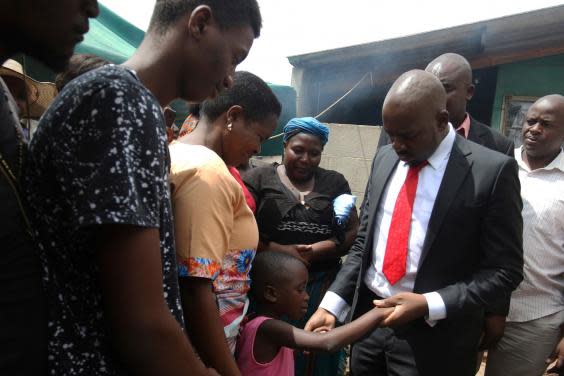Zimbabwe protests: Government warns violent crackdown is ‘taste of things to come’ as families mourn
Zimbabwe’s government has warned its brutal crackdown on protesters is a “foretaste of things to come” as families mourned the deaths of at least a dozen people.
Speaking to the state-controlled Sunday Mail newspaper, President Emmerson Mnangagwa’s spokesperson denied the widely-accepted conclusion that the protests are the result of a dramatic increase in fuel prices.
Instead, George Charamba accused Nelson Chamisa, leader of the country’s main opposition party MDC, of organising the protests and warned of retaliation.
“Government will not stand by while such narrow interests play out so violently. The response so far is just a foretaste of things to come,” Mr Charamba said.
The government’s statement came as many mourned the death of a young footballer who was gunned down by security forces on Tuesday.
Kelvin Tinashe Choto was one of at least a dozen people killed in the past week in the crackdown by security forces.
Soon after the 22-year-old was killed, a photo of his battered body lying on the reception counter of a local police station circulated on social media.
Mr Choto’s killing has become a flashpoint for the protests and crackdown, which has undermined many Zimbabwean’s faith in Mr Mnangagwa’s government.
Mr Chamisa attended the service for Mr Choto and denounced the violence by security forces, arguing the victims of this week’s attacks should be compensated by the government.
“This is a sick government,” he said at the funeral, as he held Mr Choto’s seven-month-old daughter. “Because no serious government will deploy the military and ammunition on ordinary citizens.”

Unlike some people who have been attacked by security forces, Mr Choto was not a political activist. He was the captain of a small football team near Harare and had been planning to travel to South Africa to play for a better-paying team.
“He was our future,” said his father, Julius Choto, at the funeral on Saturday. “He was disciplined, respectable and non-violent. All he cared for was his football.”
Mr Choto says his son had been watching the protests from a football pitch when he was gunned down.
“I have been robbed,” his father said. “He was my only son and his future was bright. I have been robbed by the state.”
Dozens of Zimbabweans have reportedly been shot during the crackdown. Other say they have been hunted down in their homes at night and severely beaten by soldiers and masked men in plain clothes.
Two men, who spoke on condition of anonymity for fear of retaliation, told Associated Press they were brutally beaten by security forces.
"They came at the middle of the night, kicking doors and throwing tear gas to force us out. Once they had rounded up all the men in the area, they assaulted us using motorbike chains," one man said, speaking of security forces going from house to house.
Albert Taurai, who was in hospital with a broken spine, said he was attacked by armed men in plain clothes when he ventured out to look for bread.
He said they struck him and others with iron bars on the back, thighs and ankles “so that we would not be able to run away.”
“I am 46 years old,” Mr Taurai told AP. “I have seen both Mugabe and Mnangagwa. This just is worse than Mugabe."
The reports of attacks came as the government-imposed internet shutdown continued across the country, which critics have called an attempt to cover up abuses.
Dewa Mayhinga, southern Africa director for Human Rights Watch, said the internet shutdown has allowed security forces to commit violence “away from the glare of the international community.”
Mr Charamba said on Saturday night that the shutdown was designed to stop coordinated violence by protesters.
Additional reporting by agencies
